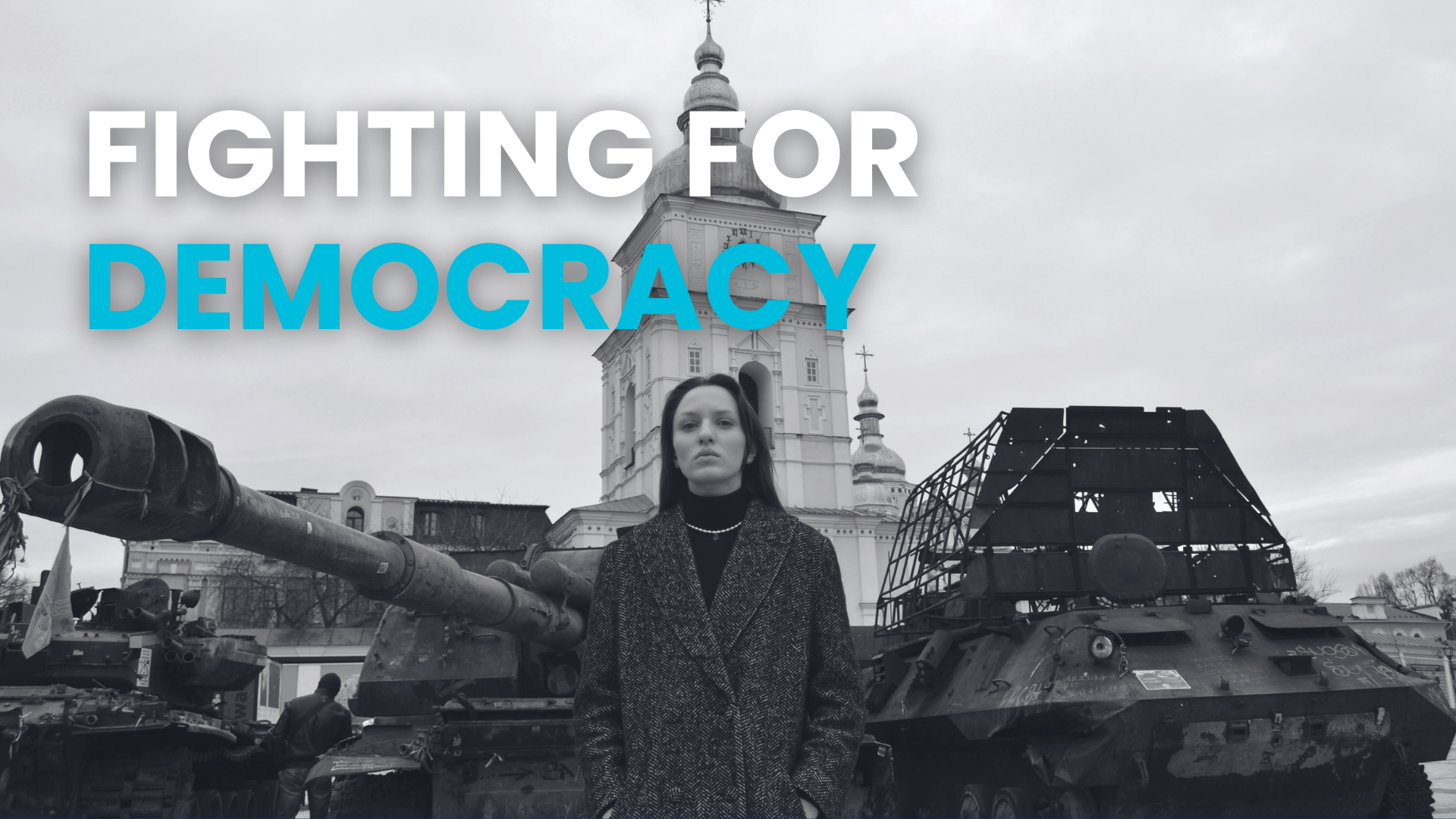Interview with Viktoriia Klymenko, our Ukraine-based content creator, on her life in Kyiv during the war

As we reach one year since the beginning of Russia's invasion of Ukraine, it is more important than ever to remember that this massive tragedy has far-reaching human consequences. Historical moments like these require sustained attention, interest, and effort. In order to better understand the impacts of the war in Ukraine, we asked our employee Viktoriia Klymenko, a native Ukrainian who lives in Kyiv, about how her life has been affected by the invasion.
What is your typical day like as the war has progressed? Is there a typical day?
I would probably say that the day starts with an air raid. Then comes anxiety and the sounds of explosions. You try to understand whether it was a missile strike or the air defense working. Then you go to have breakfast, but you realize that you have no power and everything is on electricity. That's why you put a gas cylinder for hiking in the middle of the kitchen and prepare breakfast.
With massive attacks on power infrastructure, blackouts are scheduled across the country. At first, it was tough to adapt because there were frequent emergency shutdowns, and in fact, I could only have two hours of power a day. And there is no electricity, so there is no connection. Therefore, we all learned to work in supermarkets, gas stations, and cafés - wherever there is a generator and Wi-Fi. Restaurants have also adapted. We often have candlelit dinners. I think Ukrainians have already become the most efficient nation that can do work in a record short amount of time while there is light.
During air raids, Ukrainians arrange impromptu concerts in the subway and bomb shelters. Our spirit cannot be broken.
Imagine listening to this 5 or 6 times per day.
How do you handle the daily reports of/scenes of destruction in your country?
At first, it was tough; I had no idea what non-humans we were dealing with. There was some naive belief that Russia knew how to fight by the rules. The first severe shock was Bucha. I remember how, on the day when the news reports came out, I burst into tears right at the team meeting and couldn't stop. I am from Bucha’s district, and looking at these photos, I understood that it could have been me, my sister, a friend, my father, or my mother. Not only that, but I was just lucky because I managed to leave at the beginning of March. Survivor's guilt is now with me forever.
When genocide becomes a daily reality, in order not to go crazy, I simply turn off my feelings. But still, every time I ask, "What is it for, and how is that possible?" the Russians invent new types of terror every time. Now it's missile attacks on residential buildings. Every time, I think it is impossible to hate more. It turns out you can. We all live with the understanding and awareness that a Russian missile can kill us at any moment. But we are used to even this.
What keeps you and your fellow citizens fighting as this war drags on?
Everything is quite simple: We have no other choice. If Russia surrenders, there will be no war; if Ukraine surrenders, there will be no Ukraine. We cannot allow this. We want to put an end to this century-long war with Russian oppression. Sometimes, we convince ourselves that we are one day closer to our victory. It gets easier.
I once read a military man's interview and remembered his words: "You are tired of the war, and I am tired of saying goodbye to life." We are losing our best people in this war, and we cannot allow this sacrifice to be in vain. That is why we continue to fight.
As a young citizen of Ukraine, what do you want to say to the rest of the world?
Stop calling it "Putin's war," and stop putting all the responsibility on him. 71% of Russians feel proud because of the war with Ukraine and the genocide of the Ukrainian people. At the same time, 86.6% of Russians support a potential attack by the Russian Federation on the territory of EU countries.
They should have no place in the civilized world until they repent, admit their mistakes, and undergo the so-called "denazification," the same as what happened to the Nazis in Germany after World War II. We have the right to rage, and we have the right to ask for support from the whole world because now we have become a shield that protects the world from tyranny and attempts to destroy democracy as such.
Every Russian is guilty. This is called collective responsibility. They did not organize a single anti-war rally. Still, in every European country, there were rallies that supported the Russian army and its incalculable crimes. You can say that it is scary to go to protests in Russia because the police will immediately take you away. And yet, for some reason, the women and men of Iran do not stop. Even with the fear of death hanging over their heads, they fight for their rights and against the tyranny of their government, and they know the price of this protest. They pay it every day. The Russians understand what is happening perfectly but keep quiet about it. Their silence is their support for genocide.
Did you expect the fighting to go on as long as it has?
In fact, we were terrified of it. We believed the war would be over in a couple of months, but sometime in the summer, we realized it would be long.
Before the war, I read Viktor Frankl's book "Man's Search for True Meaning." In his books, he described his experience in concentration camps. And he explained that the most effective thing is to find meaning in all manifestations of life, even the most terrible ones; this is precisely the component of the incentive to continue life. He believed that the meaning of life is the most crucial stress in a person.
"The first to break were those who believed everything would end soon. After them, those who did not believe that it would ever end. The ones who survived were those who focused on their actions without expectations of what might or might not happen. When we live waiting for everything to end: we seem to cling to the previous reality - and then it is psychologically difficult to survive in this reality. And those who live here and now survive."
That's why we started living here and now we work, meet friends, volunteer, donate, and live a normal life; as normal as possible in war conditions.
What future do you see for your country when Ukraine wins?
Without Russia, which means bright and beautiful. I would like to say that we will all finally be able to rest, but in reality, we will have a lot of work to do. To rebuild everything, to integrate the territories that were occupied, to bury relatives and friends who did not survive this occupation...
I hope I will never hear again that Ukraine is part of Russia and that we are brotherly nations. I believe Ukraine will take its place on the world stage and prosper in all its manifestations. Ukraine has a rich history and culture, it is original and unique, and I want the whole world to know about it.

